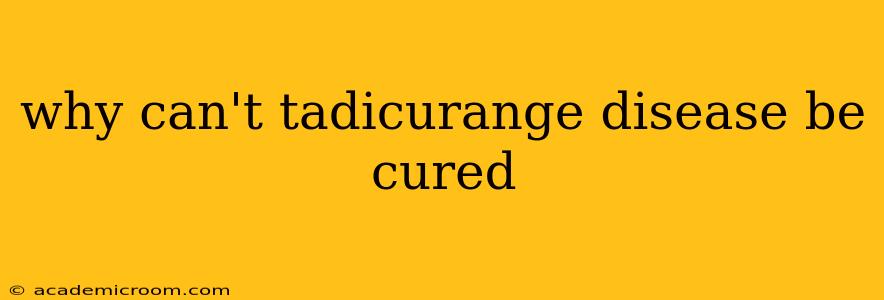Tardive dyskinesia (TD) is a serious, often irreversible, neurological movement disorder. It's characterized by involuntary, repetitive movements, primarily affecting the face, mouth, lips, and tongue. While there's no cure for TD, understanding the reasons behind its treatment challenges is crucial for managing the condition effectively.
The difficulty in curing TD stems from a complex interplay of factors:
What Causes Tardive Dyskinesia?
Tardive dyskinesia is primarily caused by long-term exposure to dopamine receptor-blocking medications, commonly used to treat mental health conditions like schizophrenia and bipolar disorder. These medications, known as neuroleptics or antipsychotics, interfere with the neurotransmitter dopamine, disrupting the delicate balance of brain chemicals that control movement. This disruption can lead to persistent changes in the brain's structure and function, making a complete reversal difficult.
H2: Is there a specific type of medication that causes Tardive Dyskinesia?
While numerous antipsychotic medications can potentially lead to TD, the risk varies depending on the specific drug and individual factors. First-generation antipsychotics (FGAs), also known as typical antipsychotics, carry a higher risk than second-generation antipsychotics (SGAs), also known as atypical antipsychotics. However, even with SGAs, the potential for TD remains, especially with prolonged use and high doses. The risk is also influenced by factors like age, genetics, and overall health. It's crucial to work closely with a psychiatrist to find the most appropriate medication with the lowest possible risk of TD.
H2: Can Tardive Dyskinesia be reversed?
Unfortunately, a complete reversal of TD is rare. Once the characteristic movements develop, they often persist even after the medication is stopped. However, some individuals may experience a reduction in symptom severity after discontinuation of the offending medication, while others might require management strategies to minimize symptoms.
H2: What are the treatments for Tardive Dyskinesia?
Current treatments focus on managing symptoms and improving quality of life. There isn't a single universally effective treatment, and approaches vary depending on individual needs and the severity of symptoms. These can include:
- Medication adjustments: Switching to a different antipsychotic medication or reducing the dosage of the current medication might help slow progression or lessen symptom severity in some cases.
- Valbenazine and deutetrabenazine: These are FDA-approved medications specifically designed to treat TD. They work by modulating dopamine levels in the brain.
- Other medications: In some cases, other medications might be used to help manage specific symptoms like tremors or muscle stiffness.
- Supportive therapies: Physical therapy, occupational therapy, and speech therapy can aid in improving mobility, daily living skills, and communication.
H2: How can I prevent Tardive Dyskinesia?
While there is no foolproof way to prevent TD, minimizing the risk involves:
- Careful medication management: Work closely with your psychiatrist to monitor your condition closely and use the lowest effective dose of medication. Regular check-ups for signs of TD are vital.
- Regular movement assessments: These assessments can help detect early signs of TD, allowing for timely interventions.
- Exploring alternative treatment options: If possible, discuss alternative treatment approaches with your psychiatrist, considering the risks and benefits.
It's essential to remember that TD is a complex and challenging condition. While there is currently no cure, effective management strategies can help control symptoms and improve the quality of life for those affected. Open communication with your healthcare provider is crucial for managing your treatment and addressing any concerns. Always seek professional medical advice for diagnosis and treatment of any medical condition.
